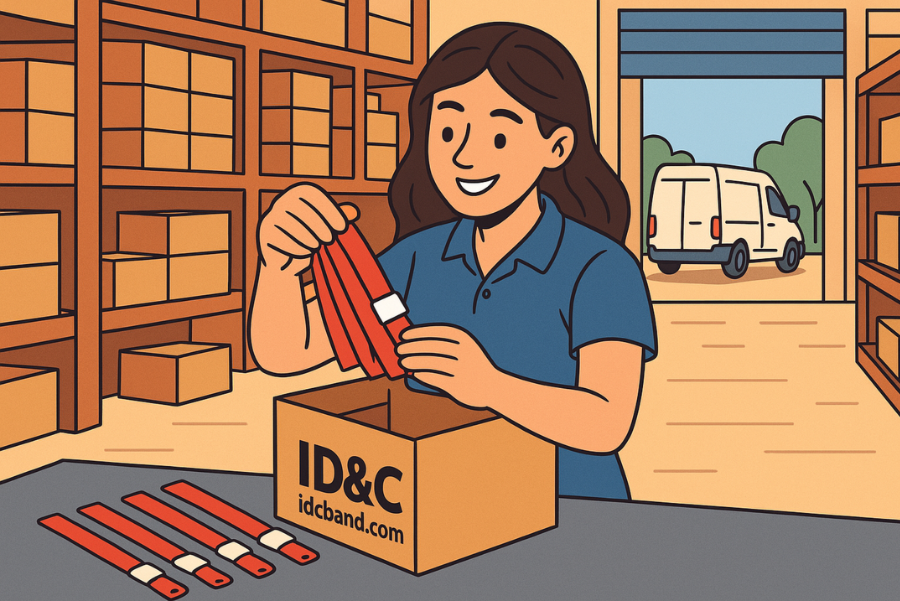Ticket fulfillment is a crucial factor in the success of any event. A good ticket & credential fulfillment strategy can make a significant impact on the number of patrons attending your event.
However, many event organizers struggle to dedicate enough time to ticket fulfillment due to their busy schedules. This can potentially lead to missed opportunities and reduced attendance. It is essential to prioritize ticket fulfillment as it directly impacts the revenue and overall success of the event.
A well-executed ticket fulfillment strategy can streamline the ticketing process, making it easier for patrons to purchase tickets and attend the event. It also allows the organizers to track sales, manage capacity, and collect valuable attendee data.
What is Ticket Fulfillment?
Ticket fulfillment refers to the process of delivering event tickets to patrons after they have made a purchase. From the point of purchase to ticket generation and delivery methods, a wide range of teams and processes are involved to facilitate ticket fulfillment. That’s why many events rely on third-party fulfillment services to get the job done.
In today's digital age, event organizers often utilize event fulfillment services to not only deliver tickets to patrons but also to provide custom credentials to enhance the overall event experience. This can include personalized badges, wristbands, or RFID cards that are tailored to each patron and their specific needs.
There might be instances when event managers rely on RFID or barcode-enabled wristbands as tickets for event entry. In such cases, the focus needs to be on credential management & fulfillment.
Ticket & Credential Fulfillment Process: How Does It Work
The ticket fulfillment process begins with constantly tracking the availability of tickets using order management software or a ticketing system.
Customers purchase tickets through various channels, including online platforms, box offices, or third-party vendors. Once the tickets are selected, customers complete the payment process. Next, the tickets are generated based on the customer's order. This could involve creating physical paper tickets, electronic tickets (e-tickets), or RFID-enabled tickets and credentials. Tickets can be delivered through various methods, depending on the event organizer or ticketing platform. Common delivery options include electronic delivery via email, mobile apps, physical delivery by mail, or in-person pickup. Some ticketing systems offer a print-at-home option, allowing customers to print their tickets after purchase.
For events that use traditional paper tickets and event credentials like RFID wristbands and badges, they are custom printed. When an order is received, the order processing system automatically sends the order details to the processing team and generates a picking list for the fulfillment team. Once fulfilled, the order is mailed and delivered to the customer's mailing address.
The order processing team is responsible for printing tickets and preparing custom event credentials. Based on the picking list, the fulfillment team then packs tickets and associated accessories and prepares for shipping. Once packed, the tickets are shipped to the customer using a designated shipping service to ensure timely delivery.
Customers may have the option to pick up their tickets at the event's box office or will-call window. In this case, customers present identification to collect their tickets in person. On the day of the event, the tickets are usually scanned or validated using barcode scanners, QR code readers, or RFID technology to allow entry into the venue. After the event, ticket fulfillment may also involve handling any post-event services, such as providing attendance reports, processing returns, or addressing customer inquiries.
Use of RFID in Ticket & Credentials Fulfillment Process
There has been a spike in event fulfillment services using the RFID technology for inventory management, warehouse management, and order fulfillment process. Inside every ticket, wristband or event badge sold, there is an RFID tag embedded with a unique identifier (UID).
When the fulfillment team receives the picking list, they scan the tickets and wristbands, associating UIDs of each credential with a specific order. This establishes a direct connection between each credential and its associated order, helping with precise tracking of the specific credential dispatched to a customer. To safeguard against shipping errors, the verification scanning process is conducted prior to packing, ensuring the UIDs align with the designated product type within the respective order.
Customers can extract this comprehensive list of credential UIDs and their respective orders, with options to incorporate this data in their own system.
Ticket Fulfillment Challenges
Ticket fulfillment services can face various challenges that can impact the customer experience and event logistics.
Delays in receiving tickets can occur due to issues with processing, shipping, or even technical glitches. Similarly, customization of wristbands and ticket packages can lead to errors or misunderstandings, resulting in the wrong tickets or poor-quality credentials being delivered to customers.
These challenges negatively impact the customer experience, leading to frustration and dissatisfaction. Moreover, event logistics can be affected by delays in receiving tickets, causing potential issues with entry management and attendee satisfaction.
To overcome these challenges, ticket fulfillment services can implement strategies such as improving communication with customers about potential delays, providing tracking information for ticket shipments, and ensuring accuracy in package customization through automated systems. Additionally, offering alternative delivery methods, such as digital tickets can provide customers with a sense of security and flexibility.
3 Common Ticket Fulfillment Strategies
There are three common ticket fulfillment strategies: internal fulfillment, hybrid fulfillment, and outsourced fulfillment.
1. Internal Fulfillment:
Internal fulfillment involves the organization handling the entire ticket fulfillment process in-house. This includes receiving the order, processing the payment, and physically delivering the tickets to the customer. This strategy gives the event organizers complete control over the fulfillment process, allowing them to maintain quality and customer satisfaction.
2. Hybrid Fulfillment:
Hybrid fulfillment combines elements of both internal and outsourced fulfillment. In this model, the event organizers may handle certain aspects of the fulfillment process, such as order processing, while outsourcing other tasks, such as ticket printing and delivery. This strategy provides flexibility and cost-effectiveness, as it allows organizers to focus on their core competencies while leveraging external expertise for other tasks.
3. Outsourced Fulfillment:
Outsourced fulfillment involves partnering with a third-party fulfillment provider to handle the entire ticket fulfillment process. This provider is responsible for receiving orders, processing payments, printing tickets, and delivering them to customers. Outsourced fulfillment is beneficial for organizers who want to minimize operational costs and streamline their processes, as it allows them to focus on their core business activities while relying on the expertise and resources of the fulfillment provider.
Overall, each of these ticket fulfillment strategies offers its own set of benefits and trade-offs, and the choice of strategy ultimately depends on the event organizers's specific needs
Benefits of Using Ticket Fulfillment Services
Using ticket fulfillment services offers numerous benefits to event planners and organizers:
- Fulfillment services ensure efficient ticket distribution, providing a streamlined and convenient process for accessing and managing tickets.
- They prioritize secure and trackable transactions, reducing fraud risk and maintaining a clear record of sales for future planning.
- These services offer customization options for organizers to design tickets, wristbands, lanyards, and badges in alignment with event branding.
- Fulfillment services provide real-time last-mile delivery tracking to keep attendees informed about the status of their ticket and credential deliveries.
- They collaborate with robust analytics tools to provide insights into sales trends and attendee demographics.
- They support multi-channel sales maximizing the reach and enabling organizers to sell tickets through various platforms, including websites, social media, and third-party ticketing partners.
- These services can add additional security features like serialization and RFID tags to the tickets, wristbands, and badges to enhance access control.
- From large conferences to exclusive member events, their scalability accommodates events of all sizes.
Ticket & Credential Fulfillment Best Practices.
1. Identifying Your Target Audience
When identifying your target audience for an event, it's important to consider various factors such as age group, budget, cultural interests, and other demographics. Different types of event goers can be broadly classified as millennials, baby boomers, Gen Z, children & family, and cultural enthusiasts.
By understanding the preferences of these different types of event goers, event organizers can tailor their ticket offerings and marketing strategies to meet the specific needs of their target audience.
2. Understanding Customer Expectations
When considering the kind of accessories and memorabilia to offer with event tickets, it's important to understand your audience's preferences. Whether it's exclusive merchandise related to the event, collectible items, or branded accessories, these add-ons can enhance the overall experience for ticket holders.
In addition, offering expedited shipping options is crucial in meeting customer expectations. Providing choices such as next-day shipping, 2-day shipping, and other fast delivery options can cater to customers who value speed and convenience when receiving their tickets and accompanying items.
When setting the price point for tickets, it's essential to carefully align it with customer expectations while also covering the cost of ticket fulfillment and other event experiences planned for the audience. This balanced approach ensures that ticket prices are reasonable and justifiable for customers, while also allowing for the inclusion of valuable accessories and memorable items.
3. Building an Online Marketplace
Building an online marketplace is a powerful way to connect with customers and drive ticket sales. Website analytics tools can provide valuable insights into user behavior, allowing you to understand how visitors interact with your site, what sales channels are most popular, and where they may be dropping off in the sales process.
By analyzing website analytics, you can gather data that will help you make informed decisions about your online marketplace. You can identify areas for improvement, such as optimizing the user experience, refining your marketing strategy, or adjusting your ticket offerings.
4. Making Informed Decisions About Resale Tickets
When deciding to resell tickets, there are several key factors to consider. First, it's important to research and understand local regulations regarding ticket resale to ensure that you comply with the law. Pricing fluctuations in the secondary ticket market can also significantly impact your ability to resell tickets for a profit, so it's crucial to stay informed about market trends and demand for specific events. Additionally, selecting the right platform for resale is vital, as different platforms may cater to different audiences and have varying fees and policies.
5. Choosing The Perfect Fulfillment Strategy
When choosing the perfect fulfillment strategy for your event, there are several factors to consider. Firstly, assess the skills and resources available within your company, as this will impact the feasibility of internal fulfillment. Consider potential fulfillment options such as in-house, third-party logistics, or a combination of both (hybrid approach). Take into account fulfillment costs, including storage, packaging, shipping, and labor expenses.
Internal fulfillment allows for greater control and flexibility but requires significant investment in infrastructure and manpower. It may also limit scalability. Conversely, outsourcing fulfillment can reduce costs and provide access to specialized expertise, but may result in less control over the process and potential delays. A hybrid approach offers the benefits of both, but requires careful coordination and management. The chosen strategy should align with your business goals and long-term vision.
6. Pay Extra Attention to Customization and Packaging
Incorporating unique designs and customized packaging materials into your ticket fulfillment process can greatly enhance the overall customer experience. Start by designing custom boxes, stickers, and event credentials such as wristbands, badges, and lanyards that reflect your brand's style and personality. Use your brand's color palette, logo, and unique patterns to create a cohesive and memorable look.
By putting extra attention into the customization of your packaging and event accessories, you can create a sense of luxury and exclusivity for your customers. When customers receive their orders in beautifully designed and branded packaging, they are likely to share their experience on social media, exposing your brand to potential new customers.
7. Streamline Shipping and Delivery Processes
One way to streamline the shipping and delivery processes of physical tickets and event credentials is by utilizing software applications to track order confirmations, manage financial transactions, order processing, custom packaging, shipment tracking, and send email updates to customers. A ticket fulfillment cycle could largely benefit by integrating ticket sales platforms with order management systems, email automation software, warehouse management software, and transport management/logistics software.
By implementing these software applications, businesses can benefit from streamlined processes that reduce the time and effort required to handle tasks, allowing for more focus on business growth. For example, order management software can automate and simplify the order processing and ticket fulfillment process, while warehouse management software can optimize space utilization and enhance packaging accuracy. Transport management software can streamline the routing and scheduling of shipments.
8. Utilize Automated Delivery Tracking Systems
To ensure fast and efficient delivery of orders to customers, many ticket fulfillment services implement the use of automated delivery tracking systems. These systems are integrated with shipping facilities such as USPS, FedEx, UPS, and DHL Express, to track the journey of each order from the warehouse to the customer's doorstep.
Customers are provided with tracking numbers for their orders, allowing them to monitor the progress of their delivery in real-time. This not only brings peace of mind to our customers but also allows for greater transparency and communication throughout the delivery process.
In the event of any delays, changes in delivery schedules, or any other issues, the fulfillment service can quickly address them and provide automated updates to the customer in real-time. This ultimately leads to a higher level of customer satisfaction and confidence in the delivery process.
9. Providing Quality Customer Experience
Providing quality service and support for customers starts with prompt and professional responses to their inquiries. It is crucial to prioritize clear and timely communication to address any questions or concerns they may have. This can be achieved by having well-trained and knowledgeable customer support staff who are equipped to assist customers effectively. Alternatively, you can use AI chatbots to address basic customer queries to reduce the load on the customer support team.
In addition, having clear policies for cancellations and refunds is equally important. Customers appreciate transparency and knowing what to expect in these situations can help minimize confusion and frustration for both the customer and the business.
When addressing customer service, key factors to consider include ticket pricing, customization options, shipping times, and a user-friendly website design. By focusing on these key factors, businesses can enhance customer satisfaction and loyalty.
How to Choose the Best Ticket & Credential Fulfillment Service
When choosing the best ticket fulfillment service for your organization, there are several key features and factors to consider. Customization options are essential to ensure that the ticketing process aligns with your branding and event needs. Ease of use is also crucial for both organizers and attendees, as a complicated system can deter potential buyers. Scalability is important for events of all sizes, as the ticketing service should be able to handle an increase in volume if necessary. Cost-effectiveness is another consideration, as the service should provide value for money without compromising on quality. Lastly, data security is non-negotiable, as the service should prioritize the protection of attendees’ personal information.
To align the unique needs and scale of your event with the right service, it's important to assess the specific requirements of your event. Consider the size and nature of your event, the expected attendance, and any special features or integrations you may need. Evaluate different ticketing fulfillment platforms based on their ability to meet these needs and provide a seamless experience for both organizers and attendees. By carefully considering these factors, you can choose a ticket & credentials fulfillment service that will ensure a smooth and efficient ticketing process for your event.










Login and Registration Form